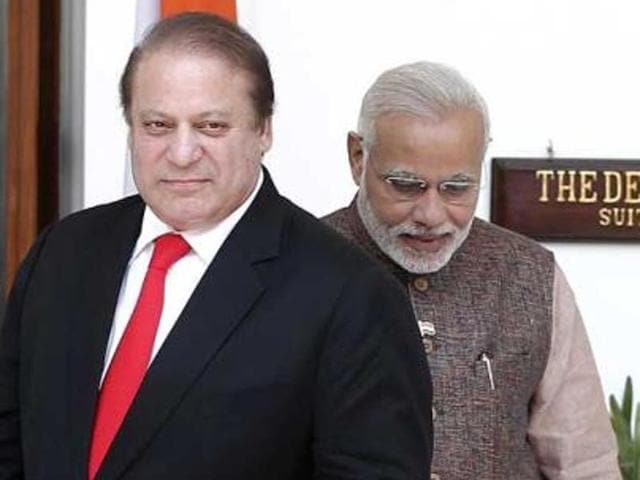India chooses optics over outcomes when dealing with Pakistan
The government’s Pakistan policy seems to be based on whims and is devoid of a real framework
The Modi government has recently warmly welcomed and rolled out the red carpet for a Joint Investigation Team (JIT) from Pakistan to come and investigate the Pathankot airbase attacks. On the subject of export of terror to India, India has always maintained that there is no distinction between the activities of State and non-State actors in Pakistan and the latter are only used as a proxy by the Pakistani establishment (mainly the army and ISI) to further its agenda of targeting India. Now, by callously inviting the Pakistani JIT to India, the government has played right into the hands of the Pakistani establishment, which conveniently offers “non-State actors” as an excuse for its export of terrorism to India. Past Indian governments have worked extremely hard and had succeeded in pushing Pakistan into a corner, by diplomatically asserting that the Pakistani State is an active abettor of terror rather than purely victim to it. The recent actions of the Modi government have washed away years of this effort and effectively dismantled the box that Pakistan was caged in; the invite to the Pakistani JIT, which includes an ISI member, is tantamount to giving it a clean chit on terror incidents.

Read | 5 things about Pak Pathankot attack probe team’s India visit
What is even more damning is that India is yet to get a Letter Rogatory (LR) — a request from a court to share evidence to help investigations — from Pakistan. In the absence of this letter, any evidence collected by the JIT could easily be challenged in a court of law and may not even enjoy judicial admissibility in Pakistan. So, while India may hand over conclusive proof of Maulana Masood Azhar’s and the JeM’s involvement in the Pathankot attack to the JIT, it may be de-linked from the judicial process against them in Pakistan, effectively beating the entire purpose of the said investigation. The Indian government has claimed to have received assurances from the Pakistani authorities about the non-requirement of the LR, but by accepting Pakistan’s explanation, India is being absolutely careless and not according the technicalities of another country’s judicial procedures the seriousness they deserve. This episode is but one example of the Modi government’s dismal policy vis-à-vis Pakistan, which has been marked by the absence of farsightedness, complete non-transparency and flip-flops.
Cross-border infiltration and terrorism have an unfortunate pattern of rearing their ugly heads whenever any high octane engagement is undertaken by India and Pakistan — the Lahore declaration under the earlier BJP government was followed by the Kargil War and PM Narendra Modi’s stopover in Lahore to attend PM Nawaz Sharif’s birthday and his granddaughter’s wedding resulted in Pathankot. This government has conveniently chosen to emphasise optics over outcomes when it comes to its Pakistan policy. There is absolutely no framework for engagement with Pakistan and decisions seem to be made spontaneously and on a whim. Pakistan is yet another example of the BJP’s post-election U-turns and its penchant for managing headlines over managing policy. The same Modi who, before the elections, used to talk about showing “red eyes” and loudly condemned writing “love letters” to Pakistan, has today adopted the “pappi-jhappi” doctrine to win over Sharif. Sushma Swaraj, then leader of the Opposition and now external affairs minister, who used to forcefully demand suspension of talks with Pakistan until their “aatankvaad ke thikaane” were destroyed, now refers to the Indian PM’s surprise visit to Pakistan as “statesman-like”, tweeting “Padosi se aise hi rishte hone chahiyen”.
Read | Pakistan must not keep testing India’s patience
Even after coming to power, the U-turns and flip-flops haven’t ceased. The main conspirators of the Mumbai attacks have not been brought to justice, Pakistani diplomats have not stopped meeting the Hurriyat leaders, there have been close to a 1,000 ceasefire violations since the government took office and there have been repeated terror strikes in Jammu and Punjab — killing three in Kathua (March 2015), seven in Gurdaspur (July 2015), seven in Pathankot (January 2016) and five in Pampore (February 2016). What is the BJP’s, and more importantly the government’s, position on Pakistan? Is it “talks and terror can’t go together” or “the two countries will talk only if they have to discuss terror and not Kashmir” or “the perpetrators of 26/11 and Pathankot should be brought to justice before we talk” or “any third party involvement with the Hurriyat is where we draw the red line”? Alternatively, is Modi’s Pakistan policy based on exchanging saris and shawls with the Pakistan PM, and visiting Pakistan to wish him on his birthday and attend his granddaughter’s wedding? The country needs to know, the Opposition needs to know and perhaps, most importantly, ministers in the government need to know.
India needs to negotiate from a position of strength — that means we must decide not just when and where we talk to Pakistan, but also what we talk about. The Congress has always advocated peaceful, but results-oriented, negotiations to settle all disputes with Pakistan and dealt with the situation skilfully and sensitively when in power. It made sure Parliament and the Opposition were always taken into confidence and the media periodically briefed through a single channel of communication. Now what we have is absolute mayhem and confusion — even the senior-most ministers of the government are unaware of the PM’s visit to Pakistan, the visit of the Pakistani JIT and whether or not the JIT will be provided access to the Pathankot airbase. The desire for media attention and personal glory seems to have superseded national interest to yield foreign policy that is directionless, toothless and ineffective.
Jyotiraditya Scindia is an MP and the Congress party’s chief whip in the Lok Sabha
The views expressed are personal



